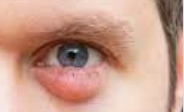Did you know that over almost 50% of adults experience dry eye symptoms?
There are many natural ways to reduce the impact dry eyes have on your lifestyle.
Take a look below at our top 8 natural ways to stop dry eyes in their tracks!
1. Blowing air is not your friend
Air conditioners, fans and blow dryers all create a perfect environment for dry eye symptoms when pointed directly at the face and eyes.
When at all possible, it’s best to avoid getting too close to these and other sources of strong air flow entirely. If they can’t be avoided, try to at least make sure that they are pointed away from your eyes to reduce their impact.
Even if your A/C or heater is not blowing directly on you, it can still seriously dry out the air in your home, office or car. Air that is too dry not only encourages dry eye symptoms, but it can also make your throat feel scratchy and exacerbate thirstiness.
You should aim for air humidity to be somewhere in the range of 30% to 50% for comfortable eyes, nose, and throat.
2. Sounds a bit fishy?
Along with cutting out processed salty foods where possible, adding omega-3 fatty acids to your diet can help prevent and treat dry eye symptoms.
The easiest way to get the recommended amount of omega-3 is to eat certain types of fish, including:
- Salmon
- Trout
- Tuna
- Sardines
- Mackerel
These and similar types of fish have high concentrations of omega-3, that can help your eyes stay hydrated and prevent irritation and inflammation.
3. Try these omega 3 foods
If fish isn’t your thing, there are still a lot of great food options out there that are rich enough in omega-3 fatty acids to help you out.
Try some of the following:
- Walnuts
- Flaxseed oil and ground flaxseeds
- Palm oil
- Eggs supplemented with omega-3 fats
- Vegetable oils (e.g. soybean and canola)
- Chia seeds
Although these sources are not as rich in omega-3s as salmon and similar fish, they can still aid in tear production and reduce eye irritation and inflammation.
You may also consider adding an omega-3 supplement to your diet.
If dry eyes are impacting your life, schedule an appointment with an eye doctor near you.
SEE RELATED: Why is Dry Eye Worse in the Mornings?
4. Stay hydrated
As any health enthusiast will tell you, too many people forget to drink enough water each day. Dehydration causes issues and breakdowns all over the body, and your eyes are no exception. Not drinking enough water is a common reason people experience dry eye symptoms.
In order to stay properly hydrated, you should aim to drink about 8 to 10 glasses of water each day.
You can accomplish this by setting alarms on your phone to remind you to drink, downloading special apps designed to help you track your water intake throughout the day, and adding water rich foods such as watermelon and cucumber to your diet.
5. Add air moisture
Dry air in the house or office is one of the leading causes of dry eye symptoms. A humidifier will add more moisture into the air, and should be a standard fixture for those who routinely deal with dry eye issues.
If you don’t have a humidifier, you can also place a pan of water near a radiator or heater. The heat from these sources will cause the water to evaporate, putting more moisture into the air, just as a proper humidifier would.
6. Air quality is key
While dirt, dust and pollen floating in the air can get in the eye or cause allergic reactions that increase inflammation and dry eye symptoms.
Clean out the air in your home or office by bringing in an air purifier.
These clean the air using a special filter for catching allergens and other irritants that can add to dry eye symptoms, including redness, itchiness, irritation and burning. Be sure to replace the filter periodically so that you don’t wind up recirculating the same dirt into the air that you originally captured.
7. Wear eye shades to sleep
Because the entire body relaxes during the deepest parts of sleep, we ultimately wind up sleeping with our eyes ever so slightly open.
If you suffer from dry eye syndrome, this can cause you to wake up many mornings to find that your eyes feel red, dry, and itchy from the very start of your day.
Wearing night shades or similar eye protection while you sleep at night can help with this by allowing your eyes to avoid the drying effects of sleeping with your eyes partially open.
8. Give your eyes a screen break
In this day and age we’re all constantly staring at one screen or another. From smartphones to tablets, televisions to computers, screens are everywhere.
Unfortunately, spending extended amounts of time on smartphones, tablets, computers and watching TV has been shown to promote dry eye symptoms by considerably reducing the rate at which you blink while looking at them.
This is why it’s important to consciously blink while looking at a screen and to give your eyes a break at least every 20 minutes. Doing so will promote blinking and rehydrate your eyes.
Don’t let dry eyes impact your life, schedule an appointment with an eye doctor near you, they may have the solution you have been looking for.
LEARN MORE: Guide to Dry Eye
Almost 1 in 2 of adults experience dry eye symptoms. Fortunately, there are many natural ways to reduce your chances of experiencing symptoms, and to treat them when they emerge.
See above for our top 8 natural ways to stop dry eyes in their tracks!










